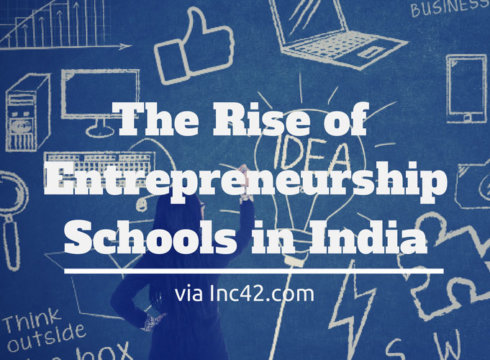Inc42 Daily Brief
Stay Ahead With Daily News & Analysis on India’s Tech & Startup Economy
There were times when getting into a management course was a rare and proud moment. Then came the time of the MBA colleges – that sprouted up like mushrooms. Getting into top management colleges became the ultimate aim of a student’s life.
Things are changing fast again. There are a new set of people who have been bitten by the entrepreneurial bug and who no longer feel the need of having an MBA degree to make their professional careers. To cater to these young and upcoming entrepreneurs, new colleges & schools with specialized curriculums on entrepreneurial skills are coming into light.
Colleges like “Indian Institute of Entrepreneurship”, “Entrepreneurship Development Institute of India”, “Infinity Business School” ,”Institute of Marketing and Management”, “Indian Institute of Entrepreneurship”, “Management and Technology” among others, have started operations in past few years to support and promote this new breed of talent.
One such institution is The Adianta School for Leadership and Innovation. Based out of Delhi, the school has developed a radical and empowering educational approach that promotes “Learning by Doing”.
“Two years back we thought we should start a training program – something that teaches innovation management. We have seen a number of corporates come to us and asking us to teach their middle and senior management what innovation consulting is, not many people do that,” says Nita Soans, Dean, Adianta School of Leadership And Innovation.
Students get to learn tools and techniques of innovation, how to build an organization, and how to lead organizations as well as social networks and movements. This kind of an integrated curriculum prepares students innovation future in a way that no other business or management school does. “We try to teach individual what they need to know, things that one learns on the job, nobody teaches you how to be a project manager, nobody teaches you how to make a work plan, or how to create timelines,” added Soans.
For the past two years the Adianta School has been working with industry partners to provide short training courses and other experimental programs in different cities of India. To Build the program and open more learning opportunities for students, it has partnered with senior leaders from organizations including Mahindra, Godrej, Tata, Vodafone, IBM, Intel, GE, the Bihar Innovation Lab, and the Bill & Melinda Gates Foundation.
Explaining the need of such programs, Nita said, “There are certain technical skills that one learns on the job, but there are some core personality skills, working skills, ways of working, that one doesn’t learn no matter who you are. No one is taught how to set up a company, how to go about it, how to hire or fire people – they all learn by making mistakes.”
So how exactly does Adianta help?
Adianta’s curriculum, is based on a nine-square grid which gives one experience in nine core leadership practices across three pillars: Innovate, Build, Lead. Each of the three pillars is in turn made up of three blocks in which one will learn and apply core leadership practices from the new world of innovative enterprise.
The students are not asked to mug up these or passively learn about these things, rather they are asked to actively practice them — through real-world projects, studio workshops and industry-sponsored internships and challenges. They are advised to use a systematic approach to innovation to create new solutions to real-world problems in business and society.
The students are taught about self-discovery; there are a number of workshops conducted such as writing your own autobiography. “We try to get people to express themselves on paper. It’s not that the people are not able to articulate themselves on paper but they are wary of that or just writing-shy. Just like there two types of people, introverts and extroverts, all are not able to go out and network, people like this need to come out of their shell, this is what we work on.”
There are over 90 workshops conducted over the year. Each workshop is a day long, starts with a lecture and then tasks are assigned where the students need to apply what has been taught.
How do people choose what idea they want to work on?
During the program, students are taught about understanding, developing and enhancing their business idea. The main thing is people should have an idea, and targeted towards the people. Then the prototype is built and brought to the market.
Citing an example, Nita explains, “Sometimes people come up with over 7-8 startup ideas, and here we ask them to apply what has been taught on these ideas like the user of centric principles, business planning and even self discovery, this automatically creates a filter and this bring one down to 2-3. This helps to process them, with the help of faculty one can work on the idea.”
What after the year?
After one year, the students develops these skills and few even end up launching a business.
What about the placements?
Unlike traditional MBA school, where students are placed into companies directly, here the faculty understands from students the key things what they want to do, what kind of role they want? Based on this Adianta helps students achieve their potential and finds them a perfect match.
Well we are positive about these new changes in our academic system and hope more and more students choose entrepreneurship instead of going to an MBA school only for getting a good corporate job.
Note: We at Inc42 take our ethics very seriously. More information about it can be found here.


